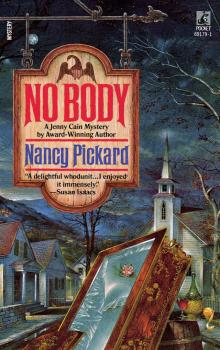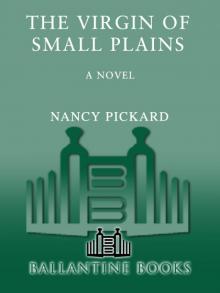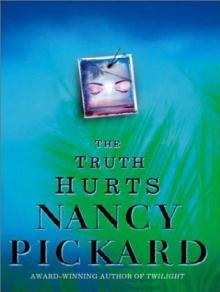- Home
- Nancy Pickard
The 27-Ingredient Chili Con Carne Murders: A Eugenia Potter Mystery Page 6
The 27-Ingredient Chili Con Carne Murders: A Eugenia Potter Mystery Read online
Page 6
Her heart ached for Ricardo and his granddaughter.
She hoped they still had one another’s company for comfort.
CHAPTER 7
Mrs. Potter was thankful for Bandy’s company on the short ride, quiet though he was. He turned into Juanita’s drive. At the end of it was a two-story white frame house to which small bedrooms and bathrooms had been added by the Potters to accommodate the growing Ortega clan through the years. Juanita and Ricardo rather rattled around in it now, except when the children and grandchildren came to visit, which was satisfyingly often, and a pointed contrast, Mrs. Potter thought, to grandparents like Gallway and Lorraine Steinbach, whose offspring rarely visited Lost Dutchman Ranch.
Mrs. Potter tried not to judge people, but it was difficult not to draw … conclusions from the relationships that her friends had with their respective (but not always respectful) grandchildren. Che Thomas, for example, who was long-widowed from Frank Thomas and the mother of two sons, boasted of having her grandkids happily underfoot every summer and Christmas at the C Lazy U. It was hard to tell, though, whether it was their glamorous grandmother the kids adored or her fabulous Disneyland of a home—with its horses and cowboys, buckboards and rodeos.
To Mrs. Potter’s knowledge, no one in the valley had ever laid eyes on the descendants of Marj and Rey McHenry. Mrs. Potter couldn’t even have said how many little McHenrys there were in the world. Trying to be charitable, she thought, well, it’s a long way from England to Arizona. A little less charitably, she thought, my babies would love the adventure of it all.
Charlie Watt’s late wife, Helen, had been childless, but Mrs. Potter had been quietly pleased to meet many young nieces and nephews at Helen’s bedside at the hospital in Tucson. She didn’t know if they had kept up the contact with their uncle now that Charlie was alone at Section Ranch.
As for Walt and Kathy Amory, they were still in their late twenties or early thirties and hadn’t started a family yet. Mrs. Potter suspected that was just as well, if there was any truth to the rumors about Kathy and old Gallstones.
The Ortegas had offered Bandy a room and a bath in their house, now that the kids were gone, but he’d refused, evidently still preferring the privacy and independence of his little apartment above the garage.
Mrs. Potter jerked out of her reverie.
“Bandy, I see a light in Linda’s room.”
“Pero no veo sus caballos.”
He was right: she didn’t see their horses in the corral either. So they most likely hadn’t come home yet. Juanita must have turned on Linda’s light in anticipation of their return, or perhaps she’d been up there looking for some hint as to where they might have gone. The porch light was on, too, but overall there was no blaze of illumination such as one finds at a home where there’s an emergency. There were no extra vehicles in the driveway. There was no appearance of urgency to the scene at all.
“Will you come in with me, Bandy?”
“Si tú quieres.”
It was said in a reluctant tone: if you want me to.
Juanita Ortega met them at the door, looking no more than mildly surprised to see visitors on her stoop at a time when most ranchers were getting ready for bed in order to rise at dawn. A rich smell of onion and garlic wafted out to the front stoop and Mrs. Potter’s stomach gurgled embarrassingly in response.
“Heard you coming down the road,” Juanita said from behind her screen door. For a light-headed moment, Mrs. Potter thought Juanita meant she’d heard the stomach rumblings. Juanita looked as always—her plain, stern face was austerely framed by her usual thick coil of silver hair. She didn’t smile, but that wasn’t unusual for Juanita, whose thin lips held a naturally compressed line even in repose. Mrs. Potter knew that many people thought Juanita was frowning when she was really only thinking about something. “Didn’t expect it to be you, though. Welcome home. How come you’re back so early?”
“Any word from Ricardo, Juanita?”
“Not yet. Come in, both of you. I have coffee on.”
“Cerveza?” Bandy asked.
“Yes, there’s beer, but not for you, old man, not if you’re chauffeuring the señora. There’s iced tea if you want something cold. Or buttermilk. Get it yourself.”
He followed the direction her finger pointed—into the kitchen—and walked past the two women, who remained in the living room. It was furnished, as was the entire house, with inexpensive but attractive Mexican pine furniture. The chairs and couches were upholstered in practical brown leather, but pretty southwestern print fabric covered the throw pillows that adorned the room. Colorful saddle blankets and Indian blankets hung on the walls in lieu of paintings, along with handwoven baskets and hammered tin artifacts. In Mrs. Potter’s opinion, Juanita had the same knack in interior decorating that she had in cooking: to take humble ingredients and create from them something original and special. That was, as Juanita would have been the first to say, also evident in her personal appearance. By nature a plain woman, she was a good five inches shorter than Mrs. Potter and as thin in her sixties as she had been when Mrs. Potter first met her almost twenty years earlier. Her black hair, gone completely silver now, was wound around her skull in a thick braid that looked more Swedish than Spanish in its styling. But the cinnamon skin, the liquid eyes, the bits of turquoise jewelry at her earlobes and neckline, the hammered silver combs that held her braid in place, the long, full orange skirt and matching long-sleeved cotton blouse with its hand-embroidered Aztec pattern, the huarache sandals on her bare feet, all declared her heritage and her pleasure in it. In the same way that she could take basic hamburger and dress it up for company, or take simple pine furniture and decorate beautifully around it, Juanita Ortega used style and color to transform herself into a striking, if not exactly comely, woman.
Still, Mrs. Potter knew that Juanita had always borne the cross of a basically plain woman married to a naturally handsome man: other people, seeing the Ortegas together for the first time, tended to whisper, “What do you think he sees in her?” Or worse, “How’d she ever catch him?”
Some people suspected it was because Juanita had one day simply ordered Ricardo to marry her. Others, who knew the Ortegas, knew better. For one thing, nobody ever told Ricardo what to do, not even Juanita, and for another, there was real love there. You could see it in the solicitousness with which he handed her up into his pickup truck and in the scoldings she gave him when he ate too much rhubarb pie at the café at the crossroads. But most of all, it was apparent, if indirectly, in the close and loving family they had created together.
“Siéntese,” Juanita instructed her employer, who did as she was told by promptly sitting down. If Mrs. Potter hadn’t felt so concerned about Ricardo and Linda, the cooking smells in the house would have had her wandering into Juanita’s kitchen to peek under lids to see what was cooking. “So, dígame. Why are you back so soon, señora?”
The two women, so close in age, had known each other so well and for so long that it would have been natural under other circumstances for each to call the other by her first name. But Juanita wouldn’t allow that familiarity, insisting on that last remaining symbol of division and respect.
Mrs. Potter stared at Juanita in surprise at her question. This was one person from whom she couldn’t withhold the truth.
“Why, because Ricardo asked me to come, Juanita.”
“No!” His wife looked indignant, baffled. “When?”
“Why, yesterday afternoon. He called me at the cottage in Maine. Didn’t he tell you?”
“Ah, that man! Por Dios, I haven’t even cleaned your house for your arrival—”
“Oh, goodness, Juanita, I’m not worried about that, and please, don’t you be either. Listen, I don’t suppose he told you why he invited a small party up to my house tonight either, did he?”
She got a blank, angry stare in reply.
“No, I’m sorry, I see that he didn’t. Well, Juanita, when I arrived, I found the Amorys, the Steinbachs, a
nd the McHenrys at my front gate …”
Juanita had arched her eyebrows at the first two names.
“Along with Charlie Watt and Che Thomas. They claim that Ricardo called them, last night I guess, and asked them to come.”
“No comprendo.”
It was exceedingly rare for Juanita to be so at a loss for English words that she lapsed into Spanish when speaking to an Anglo. The fact that she’d done it several times already was a clue to her real state of mind, Mrs. Potter thought.
“I don’t understand it, either, Juanita.”
“Oh, por Dios, I haven’t gone to the grocery store for you, there’s not a thing in your refrigerator—”
“I’ll go tomorrow, please, don’t—”
“Your sheets need changing. I haven’t dusted since last week. I was going to wash down the kitchen cabinets next week. And the week before you came home I was going to wax those tiles in the foyer—”
“Juanita, stop. None of this matters—”
“Well!” The other woman slapped her skirted thighs vigorously, as if there was nothing wrong but that there was work to be done. “I’m glad you’re back, señora, early or no. You must be starved, if all you’ve been eating all day is airplane food. I made capirotada today, I’ll heat it up for you.…” She looked over her shoulder, toward the kitchen, while Mrs. Potter’s mouth watered at the mere thought of capirotada, which was Mexican bread pudding. “Bandy! You get your drink and then you stay out of my refrigerator! Don’t you be stealing any of my food for those ‘nephews’ of yours! You feed them on your own salary, old man. If you’re hungry, I’ll give you some pudding.…” She turned back to Mrs. Potter and lowered her voice to a stage whisper that could, Mrs. Potter feared, probably still be heard in the kitchen. “Ricardo says it’s time for Bandy to retire. He’s going to talk to you about it, and recommend that you pension him”—she gave a jerk of her head, toward the kitchen—“at quarter pay. We’ll move him out of the garage, get him settled in Nogales.…”
Mrs. Potter wasn’t entirely surprised to hear it, but it saddened her all the same. It had been, she supposed, only a matter of time. Still …
“Why now, Juanita?”
The other woman shrugged. “Because he’s useless, that’s why, and you know it, señora. What’s he good for anymore? To fertilize your roses? Put chlorine in your pool? And for that you pay him and room him and give him a truck? You could pay a young man only a little more and get a lot more work out of him.”
“But it’s been like this for quite a while, Juanita, why—”
She heard Bandy moving about in the kitchen, and subsided. This was something she’d have to debate with Ricardo, but she had a feeling there must be more to it than Juanita was telling her, otherwise Ricardo would surely have recommended retiring Bandy a long time ago. It didn’t seem to her the old man deserved firing any more today than he ever had. Surely, he was still as dependable and conscientious as ever, even if his jobs were only modest ones. Mrs. Potter wondered what Juanita’s role was in this, and whether it was her influence that turned the tide against the old man.
But that didn’t answer a more immediate concern.
Mrs. Potter left her chair and walked across the room to sit on the couch beside Juanita. She touched Juanita’s hands, the briefest of contacts, but it was enough to get Juanita to face her employer.
“My dear, why are you pretending everything is normal?”
“Because it is, of course, why else?”
“Is that why none of your family is here?”
“Why should they be here?”
Mrs. Potter sighed, feeling a very familiar frustration. Juanita Ortega had an amazing capacity for bending the world to her will, whether it was to wrest scholarships out of fine universities for her children or to wring lush flowers and vegetables out of a desert garden. Her modus operandi was simply to refuse to acknowledge what the rest of the world perceived as truth. “You’ll never get that kid in that school” was a truth she had refused, five times for five children, to hear. “Nobody can grow lettuce at this altitude in this soil” was another truth she didn’t even bother to scorn. She simply created her own vision of how her world should be, and turned it into the truth, while turning conventional wisdom on its head. Mrs. Potter admired her enormously. She also found Juanita Ortega frequently infuriating—as had school admissions officers, neighbors with weeds in their own gardens, and regularly, Juanita’s own family. Now she gazed into those stern, steady brown eyes, and her heart sank.
But this was a truth Juanita was going to have to face.
So Mrs. Potter stared right back at her longtime cook and housecleaner and friend with what she hoped was a will to match Juanita’s. She reminded herself that she was, after all, la patrona.
“Why should they be here? Because he’s their father, or grandfather, or uncle. Because she’s their daughter, or niece, or cousin. Have you tried to contact Linda’s parents, Juanita? There must be ways of reaching them in Brazil. You simply cannot keep this from them. They will never forgive you if you delay any longer. I wouldn’t, if Linda were my daughter, and neither would you. This isn’t fair of you. That’s why you should call them.” She took a breath, watching Juanita’s lips narrow into an even more stubborn line. Juanita always thought she knew best. But Mrs. Potter recognized this obstinacy as being born of fear. “And they should be here because you need them.”
“No, I don’t. Why should I? There’s nothing wrong. Those two fools have gone off to a cattle sale, or something, and I forgot to remember. So I’m the fool, okay? They told me, and I forgot, that’s all.”
No, Juanita, Mrs. Potter thought, I’m going to win this one.
“Did they take his truck?”
“No, but—”
“Is any vehicle missing?”
Juanita shook her head mulishly.
“They took their horses, didn’t they? And yet surely you don’t think they rode horseback to a cattle sale, do you?”
“They could have ridden over to somebody else’s ranch, and then hitched a ride with them.”
“With whom? You’ve called around, to inquire?”
“People can’t answer their phone if they’re not there.”
“Ricardo took a suitcase? And Linda did too?”
“If he’s only going overnight, sometimes he just stuffs fresh underwear and a razor down in his spare cowboy boots.”
“So there’s an extra pair of boots missing?”
“Or sometimes he stuffs them in a plastic bag.”
“Is his toothbrush gone?”
“He could buy one when he gets there.”
“Where, Juanita? When he gets where?”
“It’s also possible that I’m wrong about that. They may not have gone anywhere. I think they probably went out early—”
“How early?”
“Before sunup, is all I know. When I woke up, they were already gone. Probably to check on those heifers up in the northeast pastures, so they needed an early start.”
“And they’re not back yet?”
“Well, I think, yes, I think it’s possible, that one of them had an accident, don’t you, Bandy?” The old man had come back into the living room with a glass of buttermilk and sat down in an easy chair opposite the women. He didn’t respond to the question, but only stared impassively back at Juanita. “And they’re having a hard time getting back home. Bandy, do you want something to eat? Señora, I can put together some delicious enchiladas, your favorite cheese-and-onion ones, in a jiffy, if you’ll help me shred the—”
Mrs. Potter tightened her grip on Juanita, to keep her seated.
“One minute you say they’ve gone off to a cattle sale with somebody else, and the next minute you say that Ricardo has fallen off his horse.”
“I didn’t say any such thing! If either of them had an accident, it was Linda—”
“Why do you say that?”
Juanita jerked her hand out of Mrs. Potter’s grasp and sh
ot to her feet. “So, it’s tacos for you.… Bandy, los quieres también?”
Mrs. Potter, feeling a desperate sadness for her, looked up at her.
“I’m organizing a search party, Juanita.”
She thought she saw terror flit through the dark eyes.
“We will also locate an aerial search service and get them out here to start looking. Frankly, I think that’s our best bet, but we’ll also need volunteers on horseback and trucks. If Linda and Ricardo have had an accident, they could be hidden down in some arroyo or under a ledge and be hard to see from the air.” Mrs. Potter continued in the same gentle but firm tone, “I can arrange things from here, if you’ll let me. Or I can do it from my house. Where’s Ken? We need him.”
She meant Ken Ryerson, their regular part-time hired hand who also filled in at other ranches in the valley whenever an extra cowboy was needed, or the owners were away.
“He’s out …” Juanita set her mouth in a trembling line.
Mrs. Potter completed the sentence for her. “Searching for them. Good for him, although I suspect there’s not much he can do at night. I presume he’s in his truck, and not on horseback?”
Juanita nodded once, violently, as if Mrs. Potter had jerked her hair.
“Good, safer for him that way. I’ll want him to take charge of the search tomorrow, so when he gets back, no matter what time it is, I want you to send him up to me at my house. Right now, you and I are going to get on the phone to recruit volunteers. And you have to call your family. Do you have an emergency number for Linda’s parents? Have you talked to the sheriff, Juanita?”
The other woman stood stiff and still, refusing to answer.
“No?” Mrs. Potter swallowed her remonstrances. “Then I will. He will probably treat this as a missing persons case, so he won’t commit to an official search for seventy-two hours, but maybe we’ll get lucky, and he’ll pitch in with people and expertise. Especially as it’s Ricardo who’s”—she took a breath and then said clearly—“missing.”
It hurt to see Juanita flinch at the word, but Mrs. Potter persevered, feeling as if she were plowing a rocky, resistant field. She stood up so that they faced one another.

 The Scent of Rain and Lightning
The Scent of Rain and Lightning No Body
No Body The Secret Ingredient Murders: A Eugenia Potter Mystery
The Secret Ingredient Murders: A Eugenia Potter Mystery The 27-Ingredient Chili Con Carne Murders: A Eugenia Potter Mystery
The 27-Ingredient Chili Con Carne Murders: A Eugenia Potter Mystery Twilight
Twilight Marriage Is Murder
Marriage Is Murder I.O.U
I.O.U The Virgin of Small Plains
The Virgin of Small Plains Generous Death
Generous Death The Whole Truth
The Whole Truth The Blue Corn Murders
The Blue Corn Murders Say No to Murder
Say No to Murder Confession
Confession Dead Crazy
Dead Crazy The Truth Hurts
The Truth Hurts Bum Steer
Bum Steer